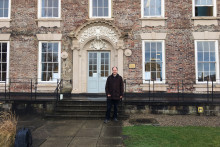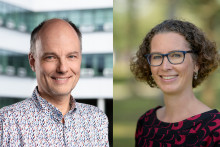biomembranes
Within the current team of Fellows, Huskens is connected to an IAS-funded project in Durham on studying the dynamics of biomembranes, in which he will collaborate on the interaction of viruses with membranes and on the formation and detection of exosomes.
The US has cancelled the INF treaty, and Russia has followed. What will that mean? A new nuclear arms race, with Europe as the main playground? Spending loads of money on presidential egos that could better be spent on causes like climate change? Or is it an economic measure to boost the US (and Russian) defense industry? Or to divert the public attention from the loss of face in Congress over the Mexican wall?
Interesting talk and discussion last week at the IAS by classicist Michele Lowrie on the development of the concept of security (securitas) in ancient Rome. Security developed from a strictly personal experience of diverting causes of anxiety into a more societal concept of national security at the time of the Roman emperors. What does it mean in current times? What can we learn from this development for the understanding of the development of our own society?
A heat stroke in Australia, more severe than ever before, higher temperatures, longer-lasting period. Unusually dry periods in Europe last summer. Climate change is evident everywhere. Why again do we elect people who either deny the fact or aren’t willing to spend serious money on averting it? Where does our education fail when we cannot get the difference between facts and beliefs across to the vast majority of the public? Why is it so difficult to obtain information in a period where information seems so abundantly available and freely accessible?
Historian Paul Pickering gave a talk this week at the IAS about the industrial revolution in Manchester in the 18th century, one of the first places where it all started. If you think that air pollution is a new thing, read about this period, where the average life expectancy of a man working in a factory was below 20. Yet, the industrial revolution has changed the world, together with other advancements such as vaccination and antibiotics which helped to eradicate premature child death and increase population. Interesting to read this week in the news that the Indian railways has received 25 million applicants for 30 thousand new jobs.
The nice thing of such a period at a different place is the opportunity to disconnect from the flow of time. To find the time to read a mind-opening book, like Daniel Dennett’s “From Bacteria to Bach and Back”, teaching us how we got this smart. Interesting times experienced in an interesting country. The Brexit is coming (or not?). And outside the lectures there is hardly any other subject that loosens the tongues of everyone so easily. Interesting also to discuss all these things amongst a small interdisciplinary group of scholars, while reality is flashing by and over our heads. A fascinating experience…







